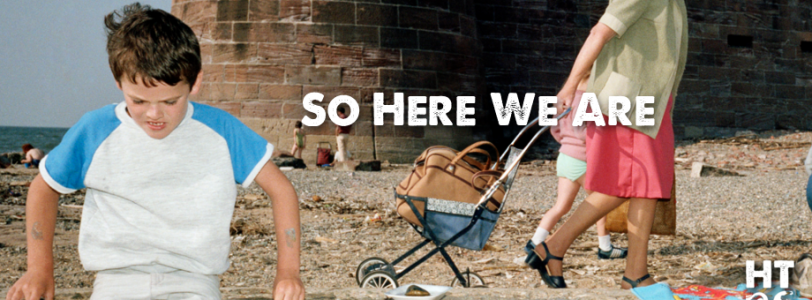So Here We Are centres around a pretty simple and sadly unexceptional premise — a young (presumably early twenties) man has died in a car accident, too early but nothing out of the ordinary. The play is split into two halves, though it is un-intervalled. The first half is set post-funeral in which the dead man, Frankie is occasionally discussed with his friends in between jokes about needing the loo, Frankie's fit mum, and being unable to play five-a-side now their fifth player is in the ground. The second scene flashes back to the moments before his death.
The first half is pure black comedy. It is here that the jokes are delivered like gunfire, one after another, all very genuinely funny. Most of the the time the characters don't fully realise that they are being funny and it is the laddish banter of early twenty-something men that the audience find themselves laughing at, again and again. Nice-but-stupid Smudge (Dorian Jerome Simpson) makes comments that are inappropriate but often well intentioned, that rile the often incredibly irritating, crassly boyish but hilariously played Pidge (Sam Melvin). Their incessant commentary on a range of subjects (well, a great deal of it centres around poo) in turn riles the more sensible and possibly more intelligent Pugh (Mark Weinman). The dialogue in this section strikes a successful balance between reality and 'stage', delivering dialogue and wit that is most probably beyond that of a group of friends chatting in real life, yet not going so far as to lose the essence of this group. It is surely this first half that earned Norris the 2013 Brentwood Prize for Playwriting, the conversations of these three characters managing to capture many things; the bland misery of a funeral where no one really wants to address the elephant in the room, the awkward stage of boy to man, when boy hasn't fully been shed and the discordant friendship that often exists between people who have grown up together, but possibly aren't the perfect fit any more. In the midst of this, it is easy to lose sight of the fourth friend, Dan (Ciaran Owens), sitting brooding at the lower corner of the stage. As Dan and Frankie's former girlfriend Kirsty (Jade Anouka) get pulled into the action halfway through this scene, it begins to become clear that this may not be as straightforward as a car accident.
Having piqued this curiosity in the first half, we are catapulted back to the life of Frankie, presumably on the day before the accident. A drunken and queasy morning-after sees Birthday boy Frankie move from friend to friend, interacting with each in a warm but disconnected manner. Something is afoot and we witness many attempts to reach out, that aren't fully recognised by his close ones. This entire half, that initially feels weaker than the hilarious-but-heartbreaking first part, catches you off guard and it is credit to Norris' writing that the twist remains under wraps until pretty close to the end. I thought I had it figured out, and was pretty disappointed by this, only to find another final layer that was handled magnificently and painfully by both actors involved. This, combined with the light relief of the play's beginning caught me in an odd middle state. It isn't flat-out devastating, it creeps up on you, a sense of shaken discomfort as the brilliant actors take their final bows.
Five minutes after the play ended, I found myself walking into the nearby White Lion Hotel and quietly blubbing away in the corner. I'm still not sure I'm fully over it.









0 Comments